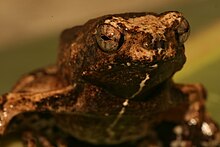Engystomops petersi
| Engystomops petersi | |
|---|---|

| |
| Scientific classification | |
| Domain: | Eukaryota |
| Kingdom: | Animalia |
| Phylum: | Chordata |
| Class: | Amphibia |
| Order: | Anura |
| Family: | Leptodactylidae |
| Genus: | Engystomops |
| Species: | E. petersi
|
| Binomial name | |
| Engystomops petersi Jiménez de la Espada, 1872
| |
| Synonyms | |
|
Physalaemus petersi (Jiménez de la Espada, 1872) | |
Engystomops petersi (common name: Peters' dwarf frog) is a species of frog in the family Leptodactylidae. It is found in Amazonian Colombia, Ecuador, and Peru. It is morphologically similar to its sibling species, Engystomops freibergi, and for a period the latter was considered to be a junior synonym of Engystomops petersi. There are records from the Guianas that have not yet been allocated to either species.[2] Divergence of these two species seems to have been driven by behavioural isolation related to male call characteristics more than geographic isolation.[3]
Description
Engystomops petersi are relatively small frogs. Males measure 21–31 mm (0.83–1.22 in) in snout–vent length and females 25–39 mm (0.98–1.54 in). Dorsal colouration is variable. Skin on dorsum is warty, bearing small tubercles with scattered larger tubercles.[4]
Habitat
Engystomops petersi is a common species that inhabits primary and secondary forests and forest edges. They are terrestrial frogs often found in leaf-litter.[1] Their diet consist of termites only.[4]
Engystomops petersi is locally threatened by habitat loss.[1]
Reproduction
The breeding period coincides with the rainy season.[1] The male call consists of a prefix and a "whine" component, and in some populations only, a third "squawk" component. Eggs are laid in foam nests.[4]
References
- ^ a b c d IUCN SSC Amphibian Specialist Group (2018). "Engystomops petersi". IUCN Red List of Threatened Species. 2018: e.T57270A85893490. doi:10.2305/IUCN.UK.2018-1.RLTS.T57270A85893490.en. Retrieved 17 November 2021.
- ^ Frost, Darrel R. (2014). "Engystomops petersi Jiménez de la Espada, 1872". Amphibian Species of the World: an Online Reference. Version 6.0. American Museum of Natural History. Retrieved 1 March 2014.
- ^ Funk, W. C.; Cannatella, D. C.; Ryan, M. J. (2009). "Genetic divergence is more tightly related to call variation than landscape features in the Amazonian frogs Physalaemus petersi and P. freibergi". Journal of Evolutionary Biology. 22 (9): 1839–1853. doi:10.1111/j.1420-9101.2009.01795.x. PMID 19583696.
- ^ a b c Funk, W. C.; Angulo, A.; Caldwell, J. P.; Ryan, M. J.; Cannatella, D. C. (2008). "Comparison of morphology and calls of two cryptic species of Physalaemus (Anura: Leiuperidae)". Herpetologica. 64 (3): 290–304. doi:10.1655/08-019.1.

